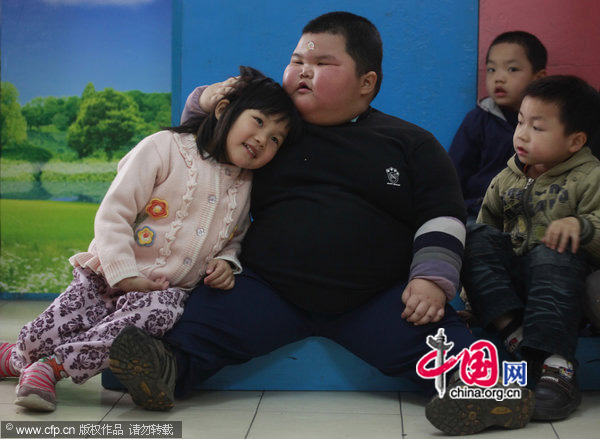Toddler fights fat in land of little emperors
In a sleepy riverside village in South China, 4-year-old Lu Zhihao tears around his home; his belly, arms and legs wobbling with fat as he stuffs a pear into his mouth.
 |
|
Lu Zhihao, a four-year-old boy who weights over 60 kg, is already five times the size of a normal child his age. |
When Lu Zhihao was born, he weighed just 2.6 kg. However, from the time he was three months old, he began to gain weight rapidly. His parents took him to three hospitals and one of them said he has a tumor in the head, while the other two said there is no tumour in the head.
"I want to be superman," said the toddler, a typically cheeky kid, but one scaling in at over 60 kilograms, which is around five times the weight of an average boy his age.
With puffed cheeks puckering up his eyes and mouth, folds of flesh like a miniature Michelin man and heavily bowed legs, the 1-meter-tall toddler's condition is suspected to be partly the result of a hormone imbalance given his height.
His loud and frequent demands for food, however, are often met by his accommodating parents and a constant stream of visitors to their lively courtyard home.
"Yum, yum, yum, yum. I like to eat fish," he said, grinning with his mouth full at dinner time as he wolfed down several bowls of rice and steamed fish.
With China's coastal cities booming amid rampant urbanization and industrialization, a new, more affluent generation of middle class families have been raising more and more pampered children like Lu Zhihao, bringing a growing blight of obesity to Chinese society.
"Little more than 20 years ago many people, even in China's richest cities, were struggling to feed themselves; now they are struggling to lose weight," wrote Paul French and Matthew Crabbe in their recent book Fat China: How expanding waistlines are Changing a Nation.
"The combination of rising incomes, greater longevity and the one-child policy meant that the 'six pocket' phenomenon appeared with each child having richer parents, grandparents, aunts and uncles -- all keen to spoil them."
Some experts describe this as the "Little Emperor" syndrome. The condition has partly resulted from the country's family-planning policy, which has been used since the 1970s to control a swelling population expected to hit 1.65 billion in 2033.
Hardly any high streets in Chinese towns and cities now are without a McDonald's or KFC, and smoking rates are among the highest in the world as the country rapidly develops and its economy skyrockets.
"Obesity is a problem for the wealthy, newly emergent middle-class consumers," wrote French and Crabbe.
Lu's mother, Chen Huan, admitted the boy throws tantrums when he's denied food. The toddler sulked on a sofa after he was refused a pack of biscuits after dinner.
"He has difficulty moving up and down stairs. He needs help getting on the bus that takes him to the childcare centre. It's also difficult to bathe him because of the rolls of fat," said Chen, who works in a factory in the province.
"Of course I worry about him. Basically his legs can't support his weight ... His heart is also under pressure because of the heavy load," said Lu Yuncheng, the boy's father, who works at a fish farm.
A 2008 Chinese National Task Force on Childhood Obesity found that almost one in five children under seven are overweight in China, and more than seven percent are obese.
 0
0 







Go to Forum >>0 Comments